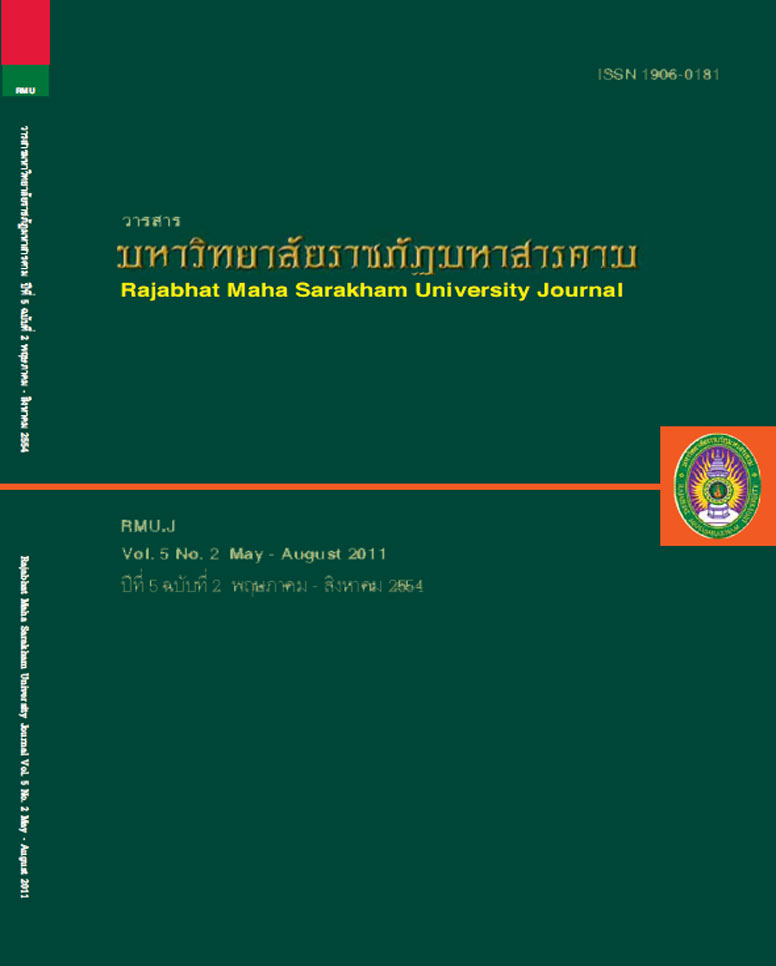ความคิดเห็นต่อการใช้ภูมิปัญญาท้องถิ่นในการบริหารจัดการแหล่งนํ้าโบราณ กับความต้องการการมีส่วนร่วมของชุมชน เพื่อการอนุรักษ์แหล่งนํ้าธรรมชาติในกลุ่มจังหวัดร้อยแก่นสาร;
Main Article Content
บทคัดย่อ
การวิจัยครั้งนี้มีวัตถุประสงค์ ประการแรก เพื่อศึกษาความคิดเห็นต่อการใช้ภูมิปัญญาท้องถิ่นในการบริหารจัดการ
แหล่งนํ้าโบราณของชุมชน ประการที่สอง เพื่อศึกษาความต้องการการมีส่วนร่วมในการบริหารจัดการแหล่งนํ้าโบราณ
ประการที่สาม เพื่อเปรียบเทียบความคิดเห็นต่อการใช้ภูมิปัญญาท้องถิ่นในการบริหารจัดการแหล่งนํ้าโบราณของชุมชน
เมื่อจำ แนกตามปัจจัยส่วนบุคคล ประการที่สี่่ เพื่อศึกษาความสัมพันธ์ระหว่างความคิดเห็นต่อการใช้ภูมิปัญญาท้องถิ่น
กับความต้องการการมีส่วนร่วมในการบริหารจัดการแหล่งนํ้าโบราณของชุมชน และประการที่ห้า เพื่อศึกษาสภาพปัจจุบัน
และปัญหาในการบริหารจัดการแหล่งนํ้าโบราณภายในชุมชนของกลุ่มจังหวัดร้อยแก่นสาร กลุ่มตัวอย่างที่ใช้ในการวิจัยนี้
ได้แก่ หัวหน้าครัวเรือนหรือผู้แทนครัวเรือนที่สามารถให้ข้อมูลได้และอาศัยอยู่จริงในชุมชนบ้านเมืองบัว อำ เภอเกษตรวิสัย
จังหวัดร้อยเอ็ด ชุมชนบ้านกู่ประภาชัย อำ เภอนํ้าพอง จังหวัดขอนแก่น และชุมชนบ้านกู่ อำ เภอนาดูน จังหวัดมหาสารคาม
จำ นวน 474 คน โดยการสัมภาษณ์แบบมีโครงสร้างและแบบไม่มีโครงสร้าง สถิติที่ใช้ในการวิเคราะห์ข้อมูล ได้แก่ ค่าเฉลี่ย
ส่วนเบี่ยงเบนมาตรฐาน และสถิติที่ใช้ในการทดสอบ ได้แก่ t-test F-test วิเคราะห์หาค่าสัมประสิทธิ์แบบเพียร์สัน และ
ทดสอบความสัมพันธ์ด้วยค่าสถิติที ผลการวิจัยพบว่า
หัวหน้าครัวเรือนหรือผู้แทนครัวเรือนมีความคิดเห็นต่อการใช้ภูมิปัญญาท้องถิ่นในการบริหารจัดการแหล่งนํ้าโบราณของ
ชุมชนโดยภาพรวมอยู่ในระดับมาก เมื่อพิจารณาเป็นรายด้าน พบว่า อยู่ในระดับมากทุกด้าน โดยเรียงลำ ดับความสำ คัญจาก
ค่าเฉลี่ยจากมากไปหาน้อยได้ ดังนี้ ด้านความคิดเห็น ด้านปรัชญาในการดำเนินชีวิต ด้านพิธีกรรม ด้านความเชื่อ และด้าน
หลักธรรมคำ สอนของศาสนา ตามลำ ดับ
หัวหน้าครัวเรือนหรือผู้แทนครัวเรือน มีความต้องการต่อการมีส่วนร่วมโดยภาพรวมอยู่ในระดับมาก และเมื่อพิจารณา
เป็นรายด้าน พบว่า อยู่ในระดับมากทุกด้าน โดยสามารถเรียงลำดับความสำ คัญตามค่าเฉลี่ยจากมากไปน้อยได้ ดังนี้ ด้านข้อมูล
ข่าวสาร ด้านเงิน ด้านวัสดุ-อุปกรณ์ และด้านคน ตามลำ ดับ
ผลการเปรียบเทียบความคิดเห็นต่อการใช้ภูมิปัญญาท้องถิ่นในการบริหารจัดการแหล่งนํ้าโบราณ เมื่อจำ แนกตามปัจจัย
ส่วนบุคคล พบว่า หัวหน้าครัวเรือนหรือผู้แทนครัวเรือนที่มีเพศ อายุ สถานภาพสมรส อาชีพ รายได้ และตำ แหน่งในชุมชน
แตกต่างกัน มีความคิดเห็นต่อการใช้ภูมิปัญญาท้องถิ่นในการบริหารจัดการแหล่งนํ้าโบราณ โดยภาพรวมแตกต่างกันอย่าง
ไม่มีนัยสำคัญทางสถิติที่ระดับ .05 ยกเว้นผู้ที่มีการศึกษาอยู่ในระดับที่ต่างกัน มีความคิดเห็นต่อการใช้ภูมิปัญญาท้องถิ่นใน
การบริหารจัดการแหล่งนํ้าโบราณแตกต่างกันอย่างมีนัยสำ คัญทางสถิติที่ระดับ .05 ในด้านความคิด
ส่วนใหญ่ความคิดเห็นต่อการใช้ภูมิปัญญาท้องถิ่นในการบริหารจัดการ มีความสัมพันธ์กับความต้องการการมีส่วนร่วม
ของชุมชนในการบริหารจัดการแหล่งนํ้าโบราณ อย่างมีนัยสำ คัญทางสถิติที่ระดับ .05 ในด้านคน ด้านวัสดุอุปกรณ์ และ
ด้านข้อมูลข่าวสาร นั่นย่อมหมายถึง การที่หัวหน้าครัวเรือนจะมีส่วนร่วมของชุมชนในการบริหารจัดการแหล่งนํ้าโบราณ ด้านคน
ด้านวัสดุอุปกรณ์ และด้านข้อมูลข่าวสารหรือไม่นั้น ย่อมมีส่วนเกี่ยวข้องกับความคิดเห็นต่อการใช้ภูมิปัญญาท้องถิ่นใน
การบริหารจัดการในด้านความคิด ด้านปรัชญาในการดำ เนินชีวิต และด้านหลักธรรมคำ สอนของศาสนา ยกเว้นความคิดเห็นต่อ
การใช้ภูมิปัญญาท้องถิ่นในการบริหารจัดการในด้านพิธีกรรมและความเชื่อ มีความสัมพันธ์กับความต้องการการมีส่วนร่วมของ
ชุมชนในการบริหารจัดการแหล่งนํ้าโบราณ อย่างไม่มีนัยสำ คัญทางสถิติที่ระดับ .05 ในด้านเงิน
ผลการวิเคราะห์ข้อมูลเกี่ยวกับสภาพปัจจุบันและปัญหาในการบริหารจัดการแหล่งนํ้าโบราณภายในชุมชนของกลุ่มจังหวัด
ร้อยแก่นสาร ถึงแม้จะพบว่า ชุมชนทั้งสามได้มีหน่วยงานหลักซึ่งทำ หน้าที่เป็นผู้ประสานงานกับหน่วยงานที่เกี่ยวข้องกับการพัฒนา
ลุ่มนํ้า และที่สำ คัญมีการเปิดโอกาสให้ประชาชนได้มีส่วนร่วมในการตัดสินใจของหน่วยงานภาครัฐต่อการพัฒนาแหล่งนํ้าที่ชุมชน
ได้พึ่งพาอาศัย แต่ก็ยังขาดการวางแผนการใช้และอนุรักษ์นํ้าที่เหมาะสม ดังนั้นการที่จะสามารถบริหารจัดการแหล่งนํ้าโบราณ
เพื่อการอนุรักษ์แหล่งนํ้าธรรมชาติให้มีประสิทธิภาพได้นั้น จึงจำ เป็นต้องอาศัยประชาชนในพื้นที่เพื่อทำ การค้นหาภูมิปัญญาในการอนุรักษ์ทรัพยากรธรรมชาติ
The objectives of this research were 1) to explore opinions toward using local wisdom in
ancient reservoir management, 2) study the needs of the community participation in conserving ancient
reservoirs, 3) compare household representatives’ opinions in applying the local wisdom to ancient
reservoir management in terms of personal characteristics, 4) study the relationship between opinions
toward using the local wisdom in ancient reservoir management and the needs of community
participation in conserving ancient reservoirs, and 5) study current conditions and problems in ancient
reservoir management in Roi-et, Khon Kaen and Maha Sarakham Provinces (RoiKaenSan Province
Groups). The samples consisted of 474 household heads or representatives living in Ban Mueang
Bua Community, Kasetwisai District, Maha Sarakham Province. The data were collected by structured
and unstructured interview and analyzed by using descriptive statistics; namely, percentage, mean and
standard deviation. The research hypotheses were tested by t-test, F-test. The co-efficient correlation
between variables was analyzed by Pearson’s Product Moment Correlation Method.
The results of the research were as follows :
The research revealed that the overall opinions of the household representatives in using the
local wisdom in ancient reservoir management of RoiKaenSan Province Groups was rated at the high
level. When each aspect was considered, all aspects were evaluated at the high level ranging from opinions on philosophy in leading life, ceremonies, beliefs and religious teachings respectively.
As a whole, it was also found that the needs in community participation of households
representatives was at the high level. Each aspect was also rated at the high level ranging from
information, money, materials and equipment, and human resources respectively.
The findings showed that the opinions of the household representatives with difference in gender,
age, marital status, occupation, income and positions in the community on using the local wisdom in
ancient reservoir management of RoiKaenSan Province Groups were insignificantly different at .05 level.
But those who were different in education levels showed different opinions on idea aspect.
The opinions on using the local wisdom in ancient reservoir management was related to community
participation in human resources, materials and equipment and information aspects with the statistical
significance at .05.
The household representatives’ decision in participating in ancient reservoir management in
the aspects of human resources, materials and equipment and information depended on their opinions
on using the local wisdom in ancient reservoir management in the aspect of ideas, philosophy in the
way of life, and religious teachings. However using the local wisdom in ancient reservoir management in
the aspect of ceremonial performances and beliefs were no related to the community participation to
reserve ancient reservoir in aspect of money at .05 significant level.
Concerning the present situations and problems in the ancient reservoir management of
RoiKaenSan Provincial Groups, it was found that the communities had three main units responsible for
coordinating with other related sectors. What was important was that they gave an opportunity to people
participation in developing water resources but still lacked appropriate plans. Thus whether efficient
management of ancient reservoirs would be possible or not relied on local people in searching for local
wisdom to conserve natural resources.
Article Details
1. บทความที่ลงตีพิมพ์ทุกเรื่องได้รับการตรวจทางวิชาการโดยผู้ประเมินอิสระ ผู้ทรงคุณวุฒิ (Peer Review) สาขาที่เกี่ยวข้อง อย่างน้อย 3 ท่าน ในรูปแบบ Double blind review
2. ข้อคิดเห็นใด ๆ ของบทความที่ลงตีพิมพ์ในวารสารมหาวิทยาลัยราชภัฏมหาสารคาม นี้เป็นของผู้เขียน คณะผู้จัดทำวารสารไม่จำเป็นต้องเห็นด้วย
3. กองบรรณาธิการวารสารมหาวิทยาลัยราชภัฏมหาสารคาม ไม่สงวนสิทธิ์การคัดลอกแต่ให้อ้างอิงแสดงที่มา


